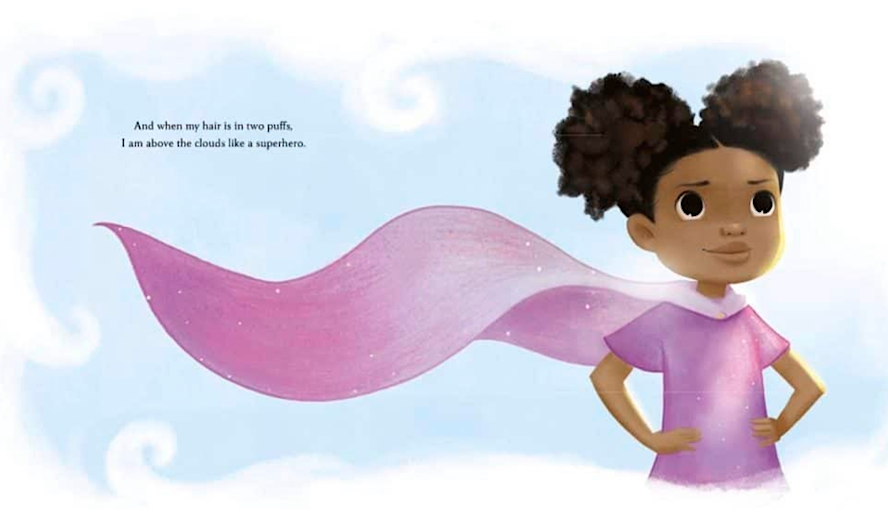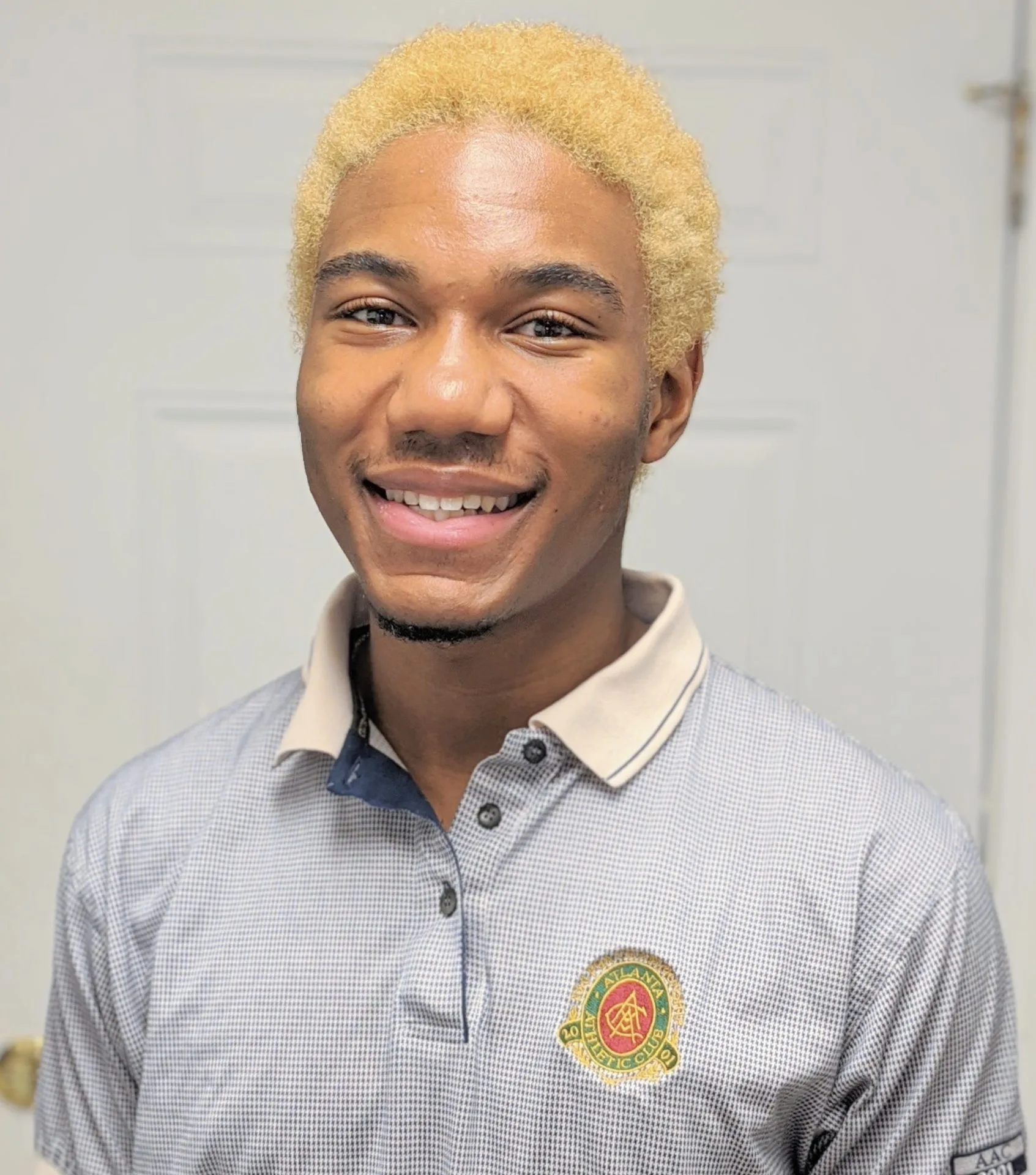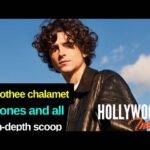Table of Contents

Photo: ‘Hair Love’/Penguin Random House
Black hair is divine. Twisted in our strands is an ancestral blessing to be beautiful. Locked in our locks are a heritage of tradition, cultural richness, and the secret arts of our crown. Our dreadlocks, Bantu knots, twists, and braids are ancient styles; their invention can not be traced. Our hair is sacred, treasurous, and for generations, has been under attack.
Sologne honestly said it best, and when a Knowles sister tells you to do something you do it! On the album ‘A Seat at the Table’, the RnB singer, and video director says “don’t touch my hair…don’t touch my pride” on the critically acclaimed song “Don’t Touch My Hair”. The song currently has over twenty-seven million views on Youtube and is an anthem for many Black women, but also a learning opportunity for many that are ignorant of the relationship Black people have with their hair.
Related article: Warner Bros. TV Signs Oscar Winner Matthew A. Cherry to Create More Meaningful Black Content
Related article: ‘The Fresh Prince of Bel-Air’ Reunion: All the Secrets, Nostalgia and Heartfelt Healing by Will Smith & Team
The colonial dominion white people have had over Black people’s self-image has been the cause of centuries of self-hate. Since the triangular slave trade, the dispersion of Black people has led to a cultural and interpersonal alienation of the meaning of Blackness under white supremacy. Black people worldwide have faced existential beauty crises, as we historically maneuver ourselves through eurocentrism and the creation of societies built on racism.
Stolen Beauty
Starting with America’s original sin, slavery erased generations of African grooming traditions. With centuries of hair grooming knowledge inaccessible, slaves are forced to turn to the likes of kerosene, butter, and bacon grease to condition and clean their hair. Lighter skinned, looser haired slaves are sold for higher prices at slave auctions‒those that passed the “paper bag test” (a test that measured skin color by being either lighter or darker than a paper bag) would become house slaves, while the darker slaves would work in the fields. This division created color consciousness amongst slaves and the internalized hatred of darker skin that would last for centuries to come.
Subscribe to Hollywood Insider’s YouTube Channel, by clicking here.
Even at the abolishment of slavery, the idea of “good hair” becomes essential to Black American culture. Hair and hairstyling became a meter that could determine one’s proximity to whiteness and thus proximity to wealth and power. Having good hair would become a necessity for many social groups, schools, and churches. Black women would have no choice but to use the likes of the hot comb to straighten their hair to inch closer to the white beauty standard.
By the early 1900s, harsh chemical straighteners (most at this point were lye-based), became a norm in Black haircare. It wouldn’t be until 1920 where we finally see a popular movement emerge for Black empowerment and self-love. Black nationalist Marcus Garvey would lead the Back to Africa Movement, a seemingly radical movement encouraging Black people to return to their African roots, abandoning the West and thus white supremacy, to rebuild the collective Black identity. His movement was about self-empowerment and thus he encouraged Black people to embrace their natural beauty, and cherish the hair that comes out of their heads.
Black Love = Black Power
The latter half of the twentieth century would head more to Garvey’s ideology as the rise of the Black Power movement re-shaped the way Black people viewed themselves on a much grander scale. Leaders of the Black Panther party like Malcolm X, Eldridge Cleaver, and especially Angela Davis would all embrace their natural hair. This time period in America gave name to the famous Afro.
Related article: The Power of Positivity: Ikorodu Bois + Chris Hemsworth + Russo Brothers + Sam Hargrave
Limited Time Offer – FREE Subscription to Hollywood Insider – Click here to read more on Hollywood Insider’s vision, values and mission statement here – Media has the responsibility to better our world – Hollywood Insider fully focuses on substance and meaningful entertainment, against gossip and scandal, by combining entertainment, education, and philanthropy.
Through the late seventies and nineties, an explosion of Black hairstyles was born. Everything from the infamously juicy Jheri Curl in the late seventies to an obsession with symmetrical shape-ups in the eighties. The nineties would inspire box and micro braids; this is also where we see an obsession with laying baby hairs or “edges”. The 90s was also a heightened time for relaxers as Black people with tighter curls would chemically alter their curl pattern. Yet, it’s in the two thousand where we start to see an uprise in a movement for natural hair and yet another intentional rejection of eurocentric beauty standards.
It’s been beautiful to watch an uprise in the appreciation of natural Black hair and an understanding of its infinite capabilities. New emphases in media like “Black Panther”, “Black-ish,” “Dear White People”, “Queen Sugar,” “If Beale Street Could Talk” and “She’s Gotta Have It,” all either implicitly or explicitly explore the possibilities and/or historical significance of Black hair. While we’re moving in a desirable direction in our representation, it’s still apparent that Hollywood favors lighter-skinned loser-curled” Black people in the entertainment industry. In 2018, Zendaya highlighted her own privilege in the industry: “I’m Hollywood’s acceptable version of a black girl”, and she’s absolutely correct. Hollywood isn’t ready for Black people’s potential just like America isn’t.
Related article: Hollywood Insider’s CEO Pritan Ambroase: “The Importance of Venice Film Festival as the Protector of Cinema”
Related article: The Masters of Cinema Archives: Hollywood Insider Pays Tribute to ‘La Vie En Rose’, Exclusive Interview with Director Olivier Dahan
A Future Where Ethnic Hair is Legally Protected
The CROWN Act or (Creating a Respectful and Open World for Natural hair) is a campaign whose goal is to end discrimination based on hair. Their website states that “Black women are 1.5x more likely to get sent home from their workplace because of their hair”. Many workplaces have discriminatory and racist hair policies that are exclusive to braids, twists, or other natural styles worn by Black people.
These predatory practices leave Black women uncomfortable in their own bodies as their hair becomes a subject of debate at work. Microaggressions like “oh my god is that your real hair”, and even nonconsensually touching a Black person’s hair can establish a toxic and racist workplace for Black people. The CROWN Act plans to alleviate some of this toxicity, unsafety, and discrimination not only in the workplace but in every institution a Black person might find themselves operating in.
“As of July 2020, the CROWN Act has been passed in six states: New York, New Jersey, Washington, Maryland, Virginia, and Colorado” according to congresswoman Robin Kelly’s website. Following, on September 29th, 2020, the U.S Congress passed the CROWN Act. Black people are closer than ever to a future where we can not be discriminated against based on the expression of our hair.
Related article: The Much Anticipated ‘Small Axe’ from Writer-Director Steve McQueen – Black Lives Matter
Related article: ‘Brother to Brother’: A Film that Evokes Poetic Questions about Historical Queerness-Blackness
Afrofuturism
Anytime one imagines a future independent of Black plight due to white colonialism, they are implementing Afrofuturism. It’s the idea that we can build a future entirely on what we have as beings apart of the African diaspora. It reshapes the scope of our future; we don’t have to carry the burden of our ancestral strife, we can work to build a way out of our current paradigm that was never constructed with us in mind. Black people’s reclamation of what our hair can be is a perfect example of this principle; Afrofuturism is about the beauty we find when we innovate and unite using Blackness as our praxis. Stepping into a new dawn of Black empowerment, we’re embracing our potential and the modern definitions of Blackness.
In a speech at Howard University, Shirley Chisholm says: “while nothing is easy for the Black man in America, neither is anything impossible…we must see ourselves in an entirely new possibility”. The pinnacle of Black self-love can not be found in eurocentrism. But it also can not be found in the internal disdain for Black people that use texturizers or relaxers or straighten their hair. In Afrofuturism, there is no room for self-hate in any sense of the word. Loving Black hair is as much about natural hair as it is about relaxed and permed hair; those products and styles are apart of who we are too.
It’s time we reshape what we are, and ask ourselves if it is truly in our nature to hate ourselves, or if that’s the residue of colonialism lingering in our psyche? The most beautiful thing about our reality as Black people is not in the way we choose to look, it’s in our resilience and dedication to finding love for ourselves in a country that has never seen it in us, to begin with; for in our limitless self-love is our potential to grow and flourish enduringly.
By Tyler Bey
Click here to read Hollywood Insider’s CEO Pritan Ambroase’s love letter to Black Lives Matter, in which he tackles more than just police reform, press freedom and more – click here.
An excerpt from the love letter: Hollywood Insider’s CEO/editor-in-chief Pritan Ambroase affirms, “Hollywood Insider fully supports the much-needed Black Lives Matter movement. We are actively, physically and digitally a part of this global movement. We will continue reporting on this major issue of police brutality and legal murders of Black people to hold the system accountable. We will continue reporting on this major issue with kindness and respect to all Black people, as each and every one of them are seen and heard. Just a reminder, that the Black Lives Matter movement is about more than just police brutality and extends into banking, housing, education, medical, infrastructure, etc. We have the space and time for all your stories. We believe in peaceful/non-violent protests and I would like to request the rest of media to focus on 95% of the protests that are peaceful and working effectively with positive changes happening daily. Media has a responsibility to better the world and Hollywood Insider will continue to do so.”
More Interesting Stories From Hollywood Insider
– Do you know the hidden messages in ‘Call Me By Your Name’? Find out behind the scenes facts in the full commentary and In-depth analysis of the cinematic masterpiece
– A Tribute To The Academy Awards: All Best Actor/Actress Speeches From The Beginning Of Oscars 1929-2019 | From Rami Malek, Leonardo DiCaprio To Marlon Brando & Beyond | From Olivia Colman, Meryl Streep To Bette Davis & Beyond
– Why Queen Elizabeth II Is One Of The Greatest Monarchs | Her Majesty Queen Elizabeth II of United Queendom of Great Britain & Northern Ireland
– Compilation: All James Bond 007 Opening Sequences From 1962 Sean Connery to Daniel Craig
– In the 32nd Year Of His Career, Keanu Reeves’ Face Continues To Reign After Launching Movies Earning Over $4.3 Billion In Total – “John Wick”, “Toy Story 4”, “Matrix”, And Many More
– Want GUARANTEED SUCCESS? Remove these ten words from your vocabulary| Transform your life INSTANTLY
Black Hair, Black Hair, Black Hair, Black Hair, Black Hair, Black Hair, Black Hair, Black Hair, Black Hair, Black Hair, Black Hair, Black Hair, Black Hair, Black Hair

Tyler Isaiah Bey is a writer and actor from Atlanta, Georgia. His emphasis on storytelling through his work guides him through his writing. His theatre background has given him a love for honest performance and a strong appreciation for art. Hollywood Insider’s focus on education, philanthropy, and anti-drama is the perfect platform for Tyler who’s unique and often intersectional perspective gives him a honed edge to the work he creates. He finds joy in discovering powerful crossroads of current events and media and infuses this cultural awareness into his writing. For it’s these intersections that make art so powerful and writing such a pleasure for Tyler.








